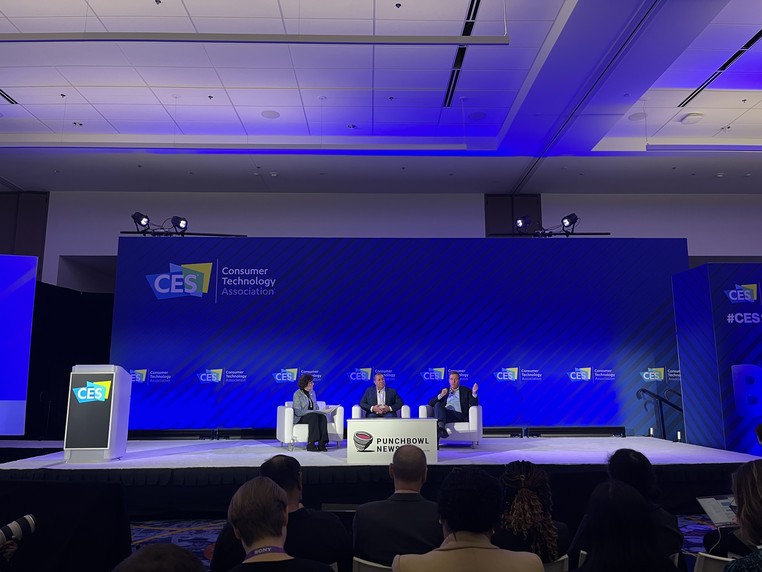A last shot of tech optimism from CES
08 January, 2023

Readers — yes, we’re coming to you Saturday! This is the last installment of our four-day on-the-ground report from CES, where we’ve been tracking the collision of federal policy, gadgets and our evolving virtual future.
LAS VEGAS— The fallout from the House’s speakership mess managed to reach even the world’s biggest consumer technology conference this weekend.
Here at CES, in a year when federal policy was a front-burner issue for the tech industry, Congress punted on its big moment: A Saturday panel aimed explicitly at outlining what the new Congress wants in innovation policy was canceled as the late vote held up the three members who’d been scheduled to attend.
But Washington’s priorities for tech in the new Congress have been made clear enough here over the past week, including on a panel held late Friday afternoon featuring Sens. Jacky Rosen (D-Nev.), Ben Ray Luján (D-N.M.), and Mark Warner (D-Va.), who hammered out their own priorities for 2023 on the convention stage.
Much of the discussion, naturally, centered around here-and-now policy issues like cybersecurity, rural broadband access and STEM education. But there was plenty of talk of the future, too, especially from Warner, who laid out his big goals on tech in terms that strongly echoed the convention’sglobal-future-minded policy discussions.
“The technology competition with China” will be a major priority for him in 2023, he said, focusing specifically on “looking at algorithms, artificial intelligence, quantum computing, advanced engineering, synthetic biology… that competition has to be dealt with in a serious way, and that's going to require innovation and investment.”
Warner, who made his own fortune as a tech VC and entrepreneur, called the current tech slump “just part of a normal cycle,” and encouraged attendees to look further out: “When
Read More : Google to pay record $391m privacy settlement
you think about all of the devices out on that floor, they’re all powered by chips — this is a long-term play,” Warner said. “Technology development and national security are inexorably linked.”Luján echoed that emphasis on innovation and funding the wonky side of the industry: “I get excited when I talk about the Department [of Energy],” Luján said. “The kind of research happening on quantum computing, applied sciences, in the world of AI, anytime there's something good happening in those worlds… there’s someone from our National Labs [involved].”
Given the major wins for Democratic, and many bipartisan, tech priorities in 2022, the overall optimistic tone of the panel was hardly a surprise. But just as with the canceled Congressional panel this morning, a specter from the House is looming over the general good vibes, at least when it comes to federal money: That of newly-minted House Speaker Kevin McCarthy, who railed against the CHIPS and Science Act as fiscally irresponsible, and agreed this week to major concessions to the fiscal-hawk Freedom Caucus members who finally helped him secure his speakership.
Another Washington emissary to Vegas this year: The United States Postal Service.
The USPS had a big presence on this year’s CES floor, showing off its Next Generation Delivery Vehicle — of which half the 50,000 being added to their fleet, the agency announced in July, will be battery-powered electric vehicles. I availed myself of the opportunity to jump behind the wheel of the NGDV, which felt, well… like being in a mail truck. (Like many of the offerings on display at CES, the really interesting things are going on under the hood of the NGDV.)
They’re also going on behind the scenes: The NGVD’s triumphant presence at CES is a sort of symbolic page-turning, after a year of controversy over the sustainability of the fleet that included 16 states suing the USPS over initial plans to have far fewer battery-powered vehicles in the new fleet, in conflict with the Biden administration’s push for USPS electrification. The NGDVs, which are being built by Madison, Wisconsin-based Oshkosh Manufacturing, are set to finally hit American streets in late 2023.
Tech companies are fans of free trade, and one tech leader on the ground at CES this week is hoping that the new Congress — and specifically the new House Select Committee on China that Speaker Kevin McCarthy envisions — tries to slow the Biden administration’s protectionist roll.
As DFD reported Friday, Information Technology Industry Council CEO Jason Oxman has certain qualms with the White House’s approach to decoupling U.S. commercial interests from China. And he thinks the new session of Congress is the perfect moment to take a harder look at those policies, and tap the brakes.
“What I fear is happening in the discussions in the Biden administration right now and in Congress as well is a conflation of national security and economic policymaking,” Oxman, who represents companies ranging from Amazon to Google to Microsoft, told me during our interview at CES.
Of course, as Mark Warner pointed out from the CES stage, this conflation of national security and tech policy is also fueling unprecedented domestic federal investments, from chips to broadband, that stand to benefit the tech industry. Oxman welcomes all that, but also suggested that Congress should probe the policies restricting outbound investment and export controls that the Biden administration has put in place, which restrict U.S. companies from investing in China. While he doesn’t dismiss security worries, he believes U.S. policy has gone further than necessary on that front.
“This is a place where the administration should kind of slow down,” Oxman said, calling on congressional panels like the new China Select Committee to assess what it would mean to allow U.S. companies to work with what he sees as China’s vibrant market of startups.
“If there are going to be restrictions on outbound investment, Congress should make those decisions,” he added. “That’s a good analysis for Congress to do.” — John Hendel
Source: www.politico.com
